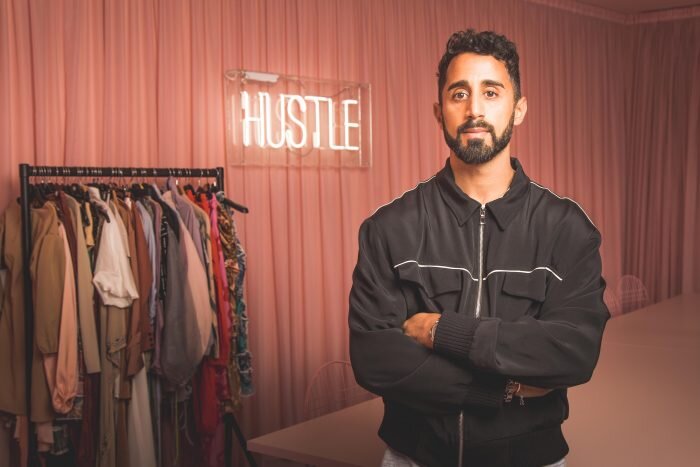'Inside Missguided: Made in Manchester,' But What About Inside The Sweatshops?
Graphic by Halima Jibril
The term “female” is used in this piece as it’s constantly used in the documentary. However, it is important to note, it is not an appropriate way to address women.
The Channel 4 documentary, Inside Missguided: Made in Manchester, presents the behind the scenes footage exploring the lives of young women working in the retail company’s offices in Manchester.
The trailer of the documentary prides itself on representing “female” empowerment through the lives of the young, confident women, who run Missguided. However, what the documentary fails to explore is the behind the scenes exploitation of the women who make the clothing and the company’s environmental impact, which affects many young women.
This is an honest review of the documentary from the eyes of a young intersectional feminist.
Image from Tellymix
The show begins with an employee from Missguided openly boasting about the company’s fast fashion culture. Fast fashion companies, like Missguided, produce high volumes of low-cost clothing items in impoverished counties with weak or non-existent labour regulations. As a result, fast fashion companies can mass produce cheap clothing with a small life to satisfy short-lived fashion trends.
In episode three, the show briefly mentions Missguided’s unethical past as a fast fashion retail company. The company’s corporate social responsibility manager openly states that Missguided used to be known as the “bad boy of the [fast fashion] industry”, referring to the 2017 scandal, during which Missguided was linked with “unethical practices”, such as paying its workers only up to £3.50 per hour.. The documentary shows the manager thoroughly auditing the supplier’s factory, such as checking the fire exits and smoke alarms, to ensure that it is safe for the workers. Although some viewers may rest assured that Missguided is treating its workers fairly, the less than ten-minute segment is simply not enough evidence to confirm the company’s ethics around fair labour.
It must be said that although the documentary does not present this, Missguided has in fact taken steps over the past few years to improve their ethics around fair labour, such as joining the Ethical Trading Initiative and signing the transparency pledge.
Even with this information, we still do not have enough information to verify the fair working conditions since Missguided’s full supplier list including subcontractors is still not available to the public. There is an even bigger question about whether Missguided still buys from supplier factories in China and South Asia, where low wages and poor conditions are the norm.
In one episode, the CEO explains that women performing a dance routine in underwear represents “women doing what they want to be doing” and thus encourages the idea that women should always be able to do whatever they want. However, many young women sweatshop workers, who are exploited by fast fashion companies like Missguided, simply do not have the choice to do “what they want to be doing” because they need a job in order to survive. Many consider themselves better with a sweatshop job than without one.
Alongside the poor working conditions, we must too consider Missguided’s impact on the environment, which in turn affects many women.
Fast fashion companies, such as Missguided, use a strategy called ‘planned obsolescence’. In short, they design clothing to become unfashionable, to wear out or to lose shape, which forces their consumers to keep buying new clothing and thus pump more money into the company.
As a result, the majority of Missguided’s clothing, if not recycled, will end up on landfill after a short period of usage. Polyester fibre, a textile commonly used by Missguided, takes over 200 years to decompose. Landfill is a big contributor to our climate change problem. The effects of climate change are great and impact not only our environment, but our people too. For example, 86% of Native Alaskan villages are at risk of climate-related damage, such as flooding and erosion.
It seems ironic that while the show stresses Missguided’s message of ‘female empowerment’, the company is also part of a huge money-making “empire of fast fashion” that negatively impacts the lives of many women across the world, such as Native Alaskan women.
I will praise the documentary for highlighting Missguided’s body-positivity focus, which is more important than ever in our society of unattainable beauty standards for women. In the second episode, women from all backgrounds audition to model for Missguided. We watch the auditions as the women talk about loving their bodies, stretch marks and all. Later in the same episode, media personality and businesswoman, Gemma Collins, appears on the show and shares that “they [Missguided] embrace plus size and curves”. It is important that young women are encouraged to embrace their bodies, whatever their shape or size. Throughout the show it is evident that the female leaders of Missguided do intend to spread this positive message.
The documentary presents a women-empowered and ethical company, which makes a strong comeback after its £26m loss in 2018. I am certain that many young women watching may feel inspired by the show and want to work at Missguided themselves. However, we must not be blind to the underlying problems that boil beneath the surface.
Image from Missguided.co.uk
Intersectional feminism aims to include women of all backgrounds and recognises that race, gender identity, sexuality, physical and mental ability, and class all influence a woman’s individual experience. As an intersectional feminist myself, I ask that Missguided recognises its flaws as a so- ‘female empowerment’ brand and recognises the rights of women from all over the world.
By Isabella Lock
(she/her)
Instagram: @isabellalock_
Twitter: @isabellalock_
Edited by Halima Jibril



